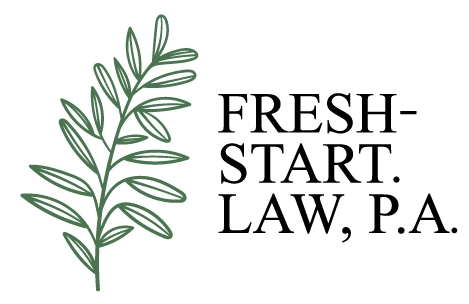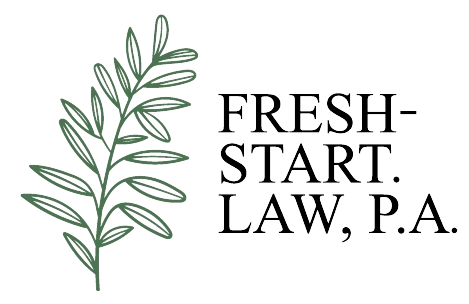Are You Facing Unmanageable Financial Challenges?
When it comes to bankruptcy, it’s all about choosing the right path to a fresh start, and that’s where we come in. You’ve likely heard of Chapter 7 and Chapter 13, but what do they mean for you in terms of eliminating debt and securing peace of mind?
Here, we will think of filing for Chapter 7 bankruptcy as a fresh start by eliminating most debts and filing for Chapter 13 as a lifeline, allowing you to restructure and repay your debts while keeping your assets.
At Fresh-Start.Law P.A. in Altamonte Springs, FL, we’re here to provide you with a clear path to a brighter future. Furthermore, we’ll break down these options in simple terms, helping you make an informed decision on the road to financial recovery.
You can also speak with an attorney to get you started on the most suitable financial recovery plan today!
What Is the Difference Between Chapter 7 And Chapter 13 Bankruptcy?
Understanding bankruptcy is your first step toward financial clarity. These two options offer distinct paths to debt relief, each with advantages and considerations.
Bear with us as we cover crucial bases to ensure you have sufficient information to deliberate your options.
Chapter 7 Offers A Fresh Start Through Liquidation
Chapter 7 bankruptcy, often called “liquidation bankruptcy,” allows individuals to quickly eliminate most of their unsecured debts.
Here’s what you need to know:
- Eligibility:
This is typically available to individuals with limited income and assets. Our experienced attorneys can evaluate your eligibility. - Debt Discharge:
It can discharge unsecured debts like medical bills, credit card balances, and personal loans, providing a clean slate. - Liquidation:
Non-exempt assets may be sold to repay creditors, but Florida’s bankruptcy exemptions can help protect many of your assets. - Speed:
Chapter 7 proceedings are typically completed within a few months, allowing you to move forward with your life more swiftly.
Chapter 13 Offers Repayment Options with A Lifeline
Chapter 13 bankruptcy offers a structured repayment plan that allows you to retain your assets while you focus on gradually paying off your debts.
Here’s what you should know:
- Eligibility:
This is suitable for those with a steady income who want to protect their assets, such as homes or vehicles. - Debt Repayment:
You’ll work with our attorneys to develop a suitable repayment plan, typically spanning three to five years. - Asset Protection:
Unlike Chapter 7, Chapter 13 allows you to retain your assets while restructuring your debts. - Stopping Foreclosure:
Chapter 13 can halt foreclosure proceedings, allowing you to catch up on mortgage payments.
Chapter 7 vs. Chapter 13 – Which Debts Can’t Be Eliminated?
As per 11 U.S.C. § 1322, Chapter 7 bankruptcy, certain debts are immovable and can’t be eliminated. These include child support, alimony, most tax debts, government fines, and student loans. And even though you’re in bankruptcy, if you’ve got loans backed by assets (secured debts), like your car or house, you’ll need to keep making payments to hold onto them.
Now, Chapter 13 bankruptcy follows a different plan. It is like a structured payment plan where you agree to pay off certain debts in full, like child support, alimony, and recent tax debts, over a period set by the court. Any liens on secured debts stick around here, too, meaning you must keep up with those payments.
But here’s the silver lining in Chapter 13 – while some debts won’t budge, like student loans and government fines, you get to negotiate the terms. It is like having a bit more control over how you handle those obligations.
Remember, it’s always a good idea to consult a bankruptcy attorney to help you navigate this financial journey.
Chapter 7 vs. Chapter 13 Bankruptcy – Which One Better Suits Which Scenario?
Choosing between the two is like selecting the right tool for the job; it depends on your unique financial scenario. Here are some simplified scenarios where one might be applicable:
Are You Closing Down Your Business?
Chapter 7 is often a suitable choice if you’re closing down a business and want to eliminate personal and business-related debts. It can provide a clean financial slate by discharging most unsecured debts, allowing you to move forward without the debt burden.
If your income is below the median for your household size in your state and you’re struggling with unmanageable unsecured debts like credit cards and medical bills, Chapter 7 can be a quicker and more straightforward solution.
Are You Undergoing a Divorce?
In that case, Chapter 13 can be valuable during divorce proceedings, especially if you have significant assets or joint debts with your spouse. It allows you to consolidate and manage debts while protecting certain assets, providing a structured approach to financial separation.
If you have a regular source of income and can create a realistic repayment plan to address your debts over time, Chapter 13 may be the ideal route. It enables you to restructure and catch up on mortgage or car loan payments while protecting your assets.
Can I Convert from Chapter 7 to 13 Bankruptcy?
Here is where knowing the difference between Chapter 7 and Chapter 13 helps. If you’ve initially filed for Chapter 7 bankruptcy but later realize that Chapter 13 might be a better fit for your situation, the good news is that you can switch.
There are two ways this can be possible.
Option 1: Voluntary Conversion:
Suppose you initially filed for Chapter 7, thinking it was the right choice. But as your circumstances evolve, you might decide that Chapter 13’s structured repayment plan suits you better.
In this case, you can voluntarily request to change from Chapter 7 to Chapter 13. Remember, to do this, you must meet Chapter 13’s requirements, which often include having a steady income to fund your repayment plan.
Option 2: Induced Conversion:
Let’s say your financial situation raises concerns, such as possible abuse or fraud in your Chapter 7 case, or if the court believes Chapter 13 would be more appropriate for your circumstances. In these cases, the court might order the switch from Chapter 7 to Chapter 13 to ensure fairness and the best outcome for all parties involved.
Whether you’re considering a voluntary switch or facing a forced conversion, consulting with a bankruptcy attorney is crucial. They’ll help you navigate the process, explain your options, and guide you through the changes to your bankruptcy case.
Let Our Altamonte Springs Bankruptcy Attorneys Help You with Your Fresh Start!
Your fresh start begins with a conversation. Reach out to Fresh-Start.Law P.A. in Altamonte Springs, FL, today for a confidential consultation. Let us help you make the right choice between Chapter 7 and Chapter 13 bankruptcy so you can regain control of your financial future.
Book a free case evaluation now!





